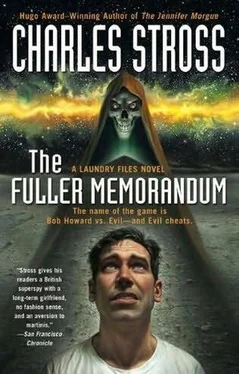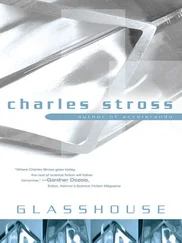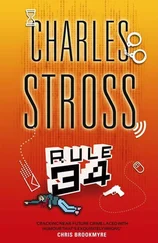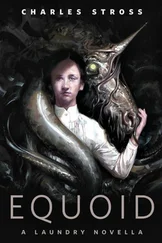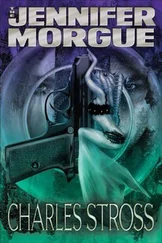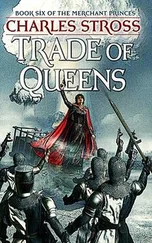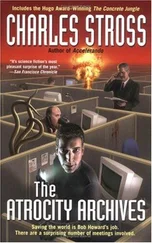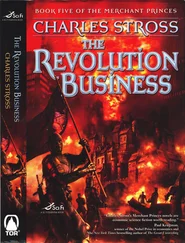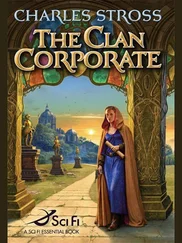Mo opens the door wide. “Dr. Mike,” she says, smiling.
“Mo?” He has a large head for his average-sized torso: brown hair fighting a hard-bitten retreat, bound in a ponytail; his eyebrows, owlishly peaked, rise quizzically at her approach. “Good to see you!”
“It’s been too long.” She walks in and they embrace briefly. “Are you busy?”
“Not immediately, no.” His desk tells a different story, piled high in untidy snowdrifts of paper-there’s a laser printer on a table in one corner, and a heavy-duty shredder right below it-with a coffee mug balanced atop one particularly steep pile. The mug reads: DURING OFF HOURS TRAINS STOP HERE. There’s a bookcase beside the desk, crammed full of phrase books and travel guides, except for one shelf, which is occupied by a tiny Z-gauge model railway layout. “Were you passing through or can I be of service in some way?”
“I was hoping to talk to you,” she confesses. “About…” She shrugs. “Mind if I sit down?”
“It’s the cross-section growth coefficient, isn’t it?” he asks, and one of his eyebrows tries to climb even farther. “Yes, yes, make yourself comfortable. Everyone has been asking about it this week.” He sighs, then backs towards his own chair, bearish on his short legs.
“I got an edited, probably garbled, version of it from Andy last week,” she explains. “The original paper isn’t on the intranet so I thought I’d ask you about it.” She nods at the door. “In person.”
“Yes… very wise.” His expression relaxes moment by moment.
“The scholars of night have been busy.”
“Word leaked.” Saturnine, he rests one hand on a graph-ruled notepad. “Or so I gather from Angleton.”
“That’s interesting.” Mo rests her violin against the side of her chair and crosses her legs. “He’s missing too, you know.”
“That’s very interesting!” Now Ford’s expression lightens. “The time has come, the Walrus said, to talk of many things.”
Mo nods. “Footwear and naval architecture I know, but I never could get my head around why you’d put wax in the ceiling. Some kind of late-Victorian loft-space insulation?”
“No, it’s-” Ford stops. “Okay, you won that round. Is this about the paper, or the leak?”
“The paper.” She leans forward expectantly.
“The first rule of paper is, there is no paper-well no, not exactly, but it’s not the kind of result I could punt at Nature, is it?”
“Right. So who reviewed it?”
Ford nods. “That’s the right question. Whose hat are you wearing?” Mo’s eyes go very cold. “There’s a little girl in Amsterdam whose parents don’t have much time for hair-splitting right now. Not that I’m accusing you of playing games, but I need to know. See, I’m conducting some research in applied epistemology. It would be rather unfortunate if you made a mistake in your logic and the Brotherhood of the Black Pharaoh have gotten themselves worked up over nothing.”
“The Brotherhood? I say, are they still going?” He meets her cold stare with one of his own. “That is simply not on. I rather thought we’d put a stop to their antics in Afghanistan a few years ago.”
“They’re a broad franchise: they’ve got any number of fronts.” She makes a gesture of dismissal. “Whoever. I’m looking into this on my own initiative. Do you have a draft I can see?”
“I think I could manage that.” He begins to hunt through the papers on his desk. “Ah, here.” He passes her three pages, held together by a paper clip.
Mo peers at the top page. “Wait, I can’t read-”
“Ah. Just a moment.” Ford waves his left hand across the paper and mutters something unintelligible under his breath.
Mo blinks. “Was that entirely safe?”
He grins. “No.”
“I, uh, see.” She peers at the abstract. “That’s interesting. Let me paraphrase. You’ve tried to quantify memetic transmission effects among a population exposed to class three abominations and find… belief in them spreads? And it’s a power function?”
He nods. “You must understand, previous models all seem to have looked at how possession spreads through a sparse network, like classical epidemiological studies of smallpox transmission, for example. But that’s flawed: if you posit an uncontrolled outbreak, then people can see their neighbors, random strangers, being possessed. And that in turn weakens the observer-mediated grid ultrastructure, making it easier for the preta to tunnel into our reality. It’s a feedback loop: the more people succumb, the weaker everyone else’s resistance becomes. I modeled it using linear programming and the results are, well, they speak for themselves.”
“And the closer we come to the Transient Weak Anomaly the more outbreaks we’re going to see, and the-it contributes to the strength of the TWA?” She looks at him sharply.
“Substantially, yes.” Dr. Mike shuffles uncomfortably in his chair.
“Well, shit.” She folds the paper neatly and slides it into her handbag. “And here I was hoping Andy had gotten the wrong end of the stick.”
“Second-order effects are always gonna getcha.” He shrugs apologetically. “I don’t know why nobody looked into it from this angle before.”
“Not your problem, not my problem.”
“Says Wernher von Braun, yes, and who says satire is dead?”
“Tom Lehrer. Or maybe Buddy Holly.”
“Right. But you said something that interests me strangely. How did the Black Brotherhood-or whoever wants us to think they’re the BBs-get the news?”
“That’s what a lot of people are asking themselves right now.” She gives him a peculiar look. “It made quite a stir, unfortunately. Lots of wagging tongues. Unfortunately Oscar-Oscar are drawing blanks and they can’t Audit the entire organization-at least not yet. We’ll have to examine the second-order consequences if the cultists learn they’ve got a turbocharger, though. If you can come up with anything…”
“Angleton would be the one to talk to about that,” he says slyly. “After all, he’s the head of the Counter-Possession Unit.”
“Angleton’s missing-” Mo freezes.
For a moment they sit in silence. Then Dr. Mike raises one preposterous eyebrow. “Are you certain of that?”

I’M GLAD I’M NOT CLAUSTROPHOBIC.
Well, I’m not very claustrophobic. Lying on my back in a coffin-sized railway carriage, rattling down a steep incline in a tunnel less than a meter in diameter that was built in the 1920s is not my idea of a nice relaxing way to spend an afternoon. Especially knowing that the station staff are zombies and I’m barreling headfirst into the depths of a high security government installation with only my warrant card to speak for me, on a mission of somewhat questionable legality.
Pull yourself together, Bob. You’ve been in darker holes.
Yes, but back then Angleton at least had the good grace to tell me what the fuck I was supposed to be doing! This time around it’s just I want you to be my tethered goat. That and the 440 volt DC rail fifteen centimeters below my spine give me a tingling sensation like my balls want to climb right up my throat and hide. I suppose I shouldn’t be surprised that there’s a back door into the stacks, or that it’s a hinky little narrow-gauge tube system constructed by a Quango and forgotten by everyone except train spotters, but to find myself actually riding it… that’s something else.
Angleton had the decency to scribble me a written order, and a good thing too, otherwise I would have thrown a strop. The librarians don’t appreciate unannounced visitors, much less informal withdrawals, and like so many of our more eccentric outposts they have their own inimitable and unspeakable ways of dealing with vandals and intruders. If they catch me, a signed order from a DSS ought to make them pause long enough to give me a fair hearing before they rip my lungs out; but, really and truly, it is usually best to just put in a request and wait for the little man with the cart.
Читать дальше
